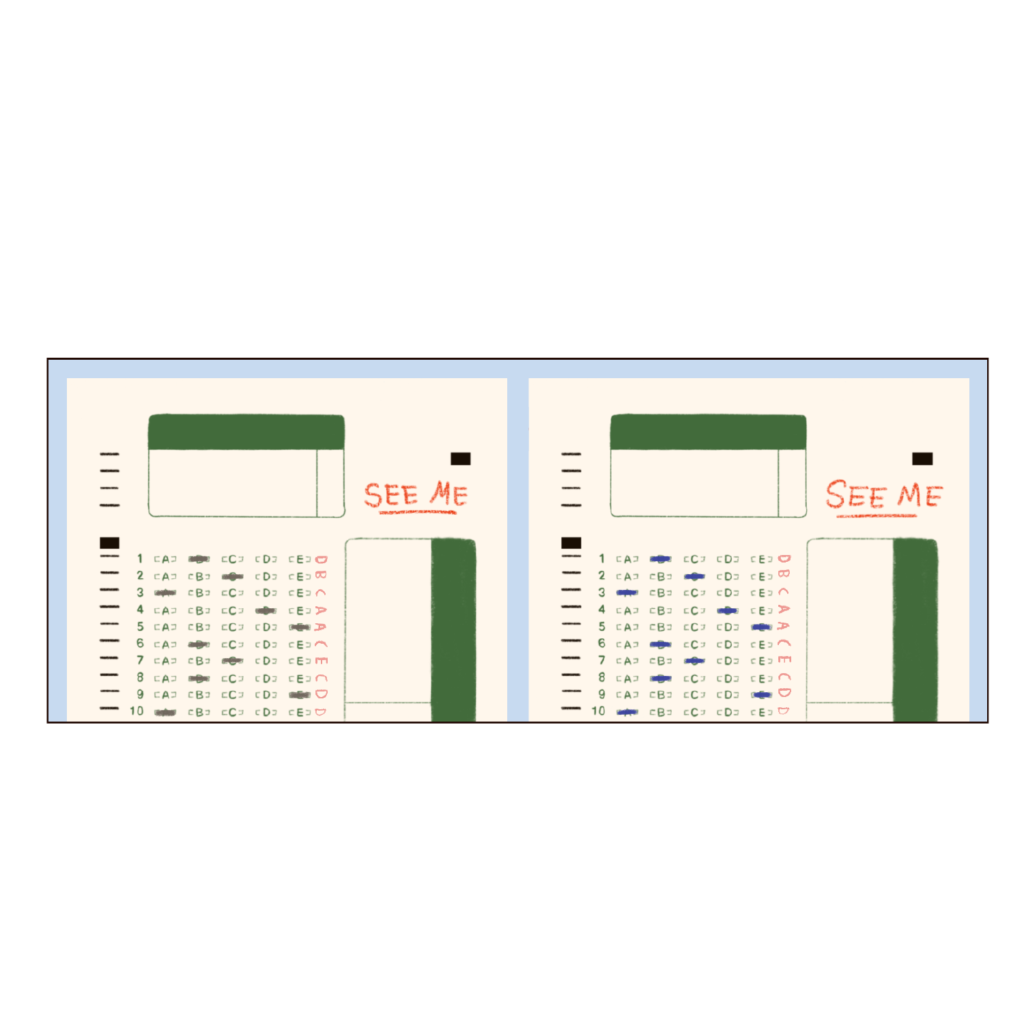Teachers address concerns of cheating in classrooms
Elina Bishoyi | The Chronicle

Rising concerns in academic dishonesty has Mason High School (MHS) teachers taking new initiatives to curb this cheating issue.
Some teachers at MHS have noticed an increase in cheating. Students have been caught using preloaded calculators, taking pictures of tests or using online platforms such as Photomath and Artificial Intelligence (AI).
MHS National Honor Society (NHS) advisor and former Chemistry teacher Barbara Shuba said that academic dishonesty has evolved to become more collaborative in recent years.
“I’ve seen a change that has a strong ripple effect,” Shuba said. “It’s gone from asking about the test generally to now very specific efforts to get pictures or even screenshots of questions.”
AP (Advanced Placement) Biology teacher Elizabeth Coleman said that she has seen this issue in her own classes, resulting in requiring the entire class to retake tests. Coleman said that she believes in forgiveness, but also wants students to recognize the consequences of their actions and the effects cheating can have on a classroom.
“If a student comes to you after the cheating incident has occurred, we can work to move past it,” Coleman said.
Shuba said that cheating can have effects beyond academics. Members of NHS who commit acts of academic dishonesty are removed from the organization.
“[Integrity] is a pillar that you commit to,” Shuba said. “It is a hard conversation with [the student] and for them to say they made a mistake and own it, but that’s part of being in NHS.”
AP Statistics teacher Steve Mays said that increasing demands placed on students contributes to the rise in acts of academic dishonesty.
“The amount of work and pressure that [students] have is so high,” Mays said. “Peer pressure, the pressure from mom and dad, scholarships, GPAs and thoughts of college – all of those pressures together are basically telling students in their minds, ‘I have to get an A in this class, by any means necessary.’”
Mays said that he recognizes the challenges students face and tries to prevent students from cheating in the first place through meaningful conversations.
“There’s a part of me that would love to be able to teach a class that could assess my students’ knowledge in different ways,” Mays said. “So, if they get stuck, instead of feeling the temptation to cheat in order to get the right answer, I could give my students the opportunity to problem solve and go to their resources and learn. I would rather set up a system for my students to be encouraged more than just, ‘I got the right answer.’”
Junior Rina Nazir says she has seen the pressures students face firsthand in her own classes.
“Many [students] that want to get into a good college overload themselves with honors/AP classes because they genuinely believe they have to,” Nazir said. “Even if those APs have nothing to do with what they plan to major in, they’re still rigorous courses that colleges like to see on a transcript.”
Honors Anatomy teacher and Science National Honor Society (SNHS) advisor Maggie Long said that cheating can have severe consequences past high school.
“Maybe [a student] wants to be a nurse or a doctor one day, how are [they] going to cheat through med school?” Long said. “[They would] lose the trust of [their] patients. Cheating may get [them] ahead in the moment but what [they] take with [them] long-term is [their] integrity.”
MHS teachers use a number of methods to reduce cheating in their classrooms, including keeping phones in secure places and separating students during testing. Mays said that he has created different forms of tests and given each student different questions in the past, but it has not addressed the root of the problem.
“As a teacher, I could spend a lot of time and effort trying to figure out ways to overcome the cheating, but that doesn’t fix integrity,” Mays said.
Long said that she wishes more students will come forward about incidents of cheating.
“We all make bad choices,” Long said. “The problem that I see is that there’s not always the ownership piece of it where a student says, ‘I made the mistake but I’m gonna move forward and I’m gonna do better. ”
Mays said that the time that students invest in cheating would be more effectively spent on genuinely learning the content. Moving forward, Mays said he hopes for a societal change.
“It’s not unusual for students to cheat,” Mays said. “[Currently] it’s unusual if you are a student who doesn’t cheat. As a culture, we need to change things.”
